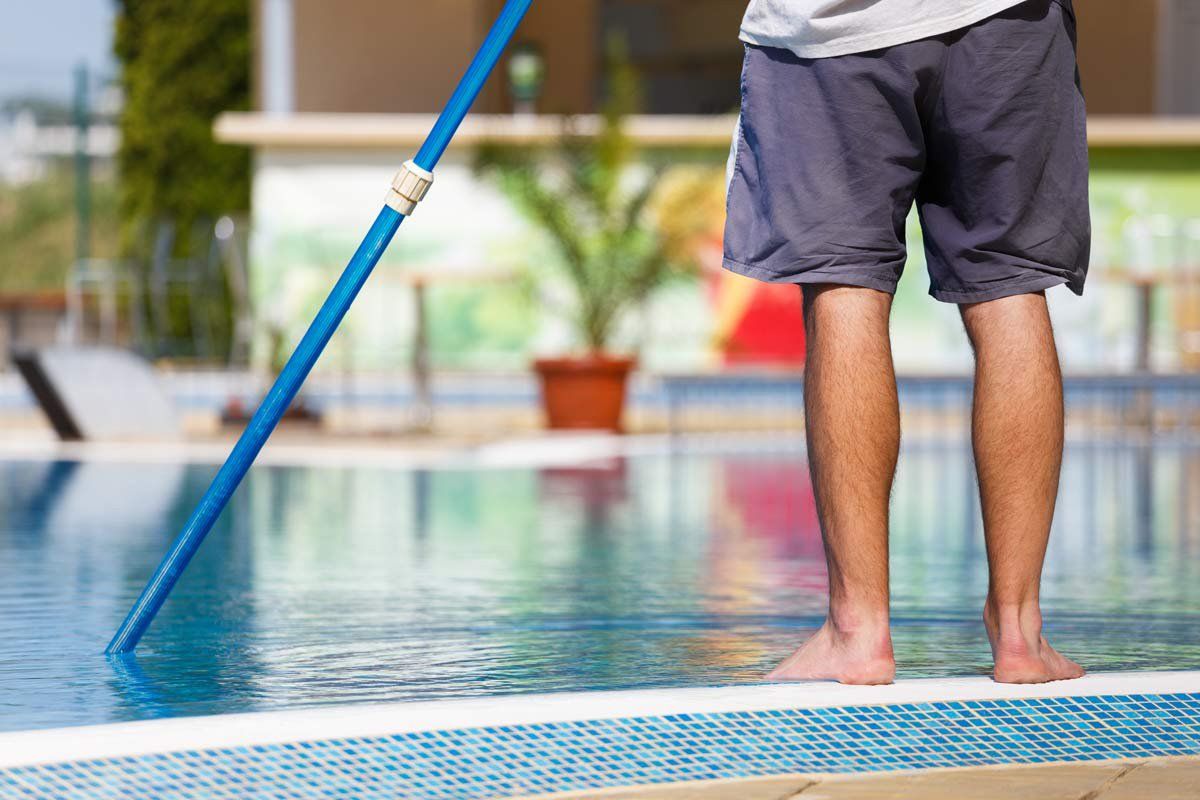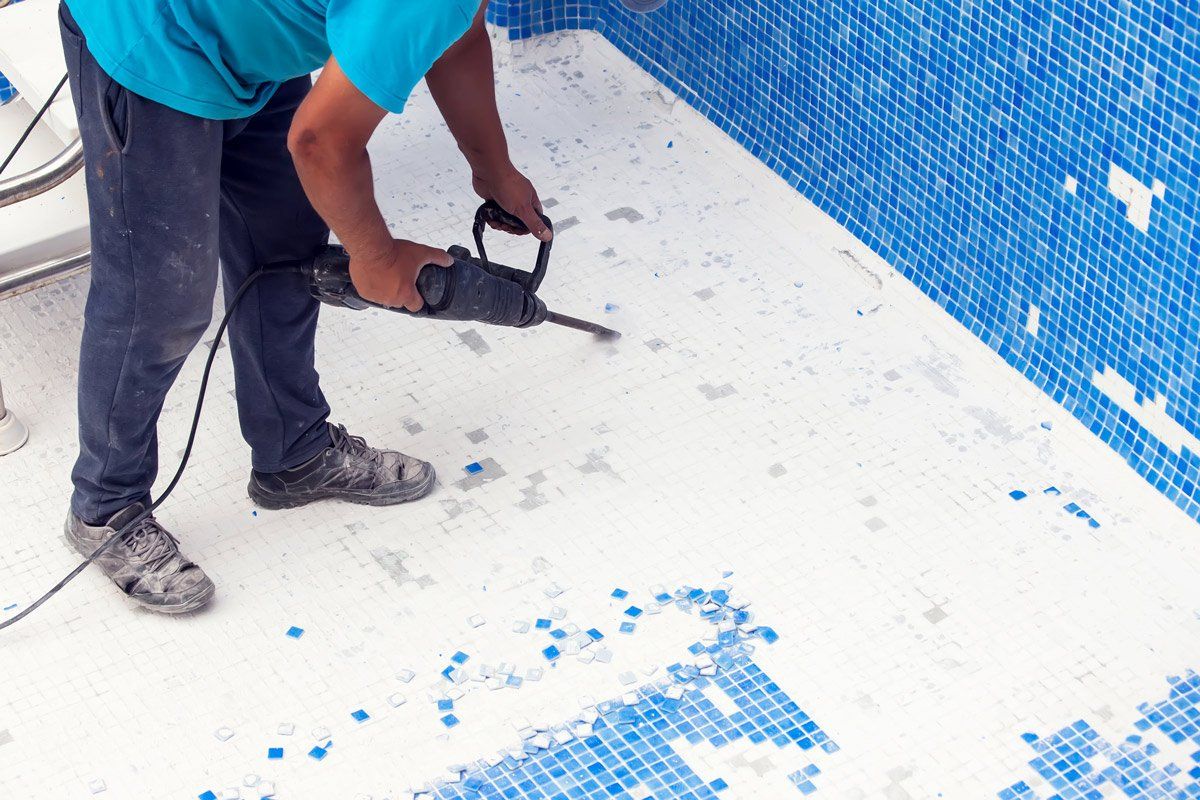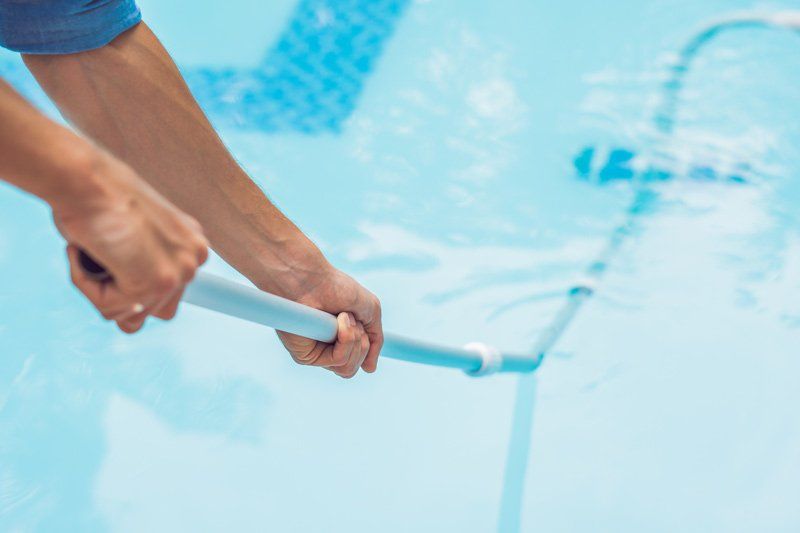How To Keep Your Pool Clean This Summer - 2022
Updated April 12, 2022

The swimming pool is a popular place for keeping cool during the summer, but don't forget your regular pool cleaning and maintenance. The tasks need to be completed every week to keep your water quality safe for swimming all summer long.
Not sure where to start with yours? Paul's Pool Magic is a professional pool cleaning service with over 36 years of industry experience but we understand that not every homeowner wants to hire a pool care company so we put together this extensive guide on how to keep your pool clean and healthy all summer long!
Why Your Pool Needs To Be Clean
Regular pool maintenance and cleaning keep the water clear and attractive. Keeping your pool clear of debris, algae, leaves, and other things that don't belong in the water will also help keep the drains clear and functioning correctly. Without proper pool cleaning, no one should be swimming. To help you establish your regular pool cleaning and service schedule, we've put together a great list of important items and steps needed to get the job done correctly.
Necessary steps for pool cleaning include:
- Using a leaf skimmer to remove debris and leaves from the water.
- Brushing the walls, ladders, and steps to loosen hardened debris.
- Vacuuming to remove debris sitting on the floor, steps, and walls.
- Checking the filter and cleaning it.
- Maintaining water circulation to filter and prevent the growth of algae and bacteria.
- Checking the water pH levels which show the chemical balance.
- Shocking the pool to destroy algae and bacteria and raise the free chlorine level.
- Adding algaecide to slow the growth of algae.
If you don't feel comfortable handling the chemicals used for cleaning, you can always schedule a weekly pool service to get the job done right by a professional.
Water Circulation
This is one of the most critical steps in pool maintenance. Circulation moves the water through the filter to remove debris and particles from the pool. Without proper filtration, impurities can build up in the water and cause the pool to be dirty. The pump also evenly distributes the chemicals throughout the system.
The best time to run the pump is during the day while adding chemicals. The pump you have installed should adequately circulate and clean the water within about eight hours each day. The entire quantity of the pool in gallons should be pushed through within that eight-hour period once a day for residential purposes.
You need to know how many gallons your pump goes through per hour and the size of your pool to calculate what size of pump you need for proper pool cleaning.
Maintaining Pool Chemistry
Maintaining the proper chemical balance keeps the water clean and helps protect essential equipment like the pump, heater, and other system components from becoming damaged. Balanced and clean water chemistry are crucial in pool maintenance.
Creating a routine for cleaning or hiring a weekly pool service will help keep things on track. One of the best processes to do is shock treatment. This will solve and prevent most of the problems that can be had with a pool.
Shocking is when chlorine or non-chlorine chemicals are added to the water to raise the free chlorine level. The level should reach a point that destroys any contaminants, including algae or bacteria. Shock is more potent than regular chlorine and should be applied differently.
Ideally, you should shock your pool in the evening after you are finished swimming to prevent the sun from affecting the chemicals or irritating your skin and eyes. Wait up to 24 hours before getting back in after completing a shock treatment.
Not sure when to do a shock treatment? Here are some cues for you to be aware of:
- After heavy rain or a windstorm.
- There are more swimmers than usual.
- The water is foul-smelling.
- After experiencing extreme temperatures.
- Swimmers experience burning red eyes.
- There is algae growth.
- The water is murky and slimy.
Safety When Handling Pool Chemicals
Handling chemicals is essential for your pool maintenance, but they can be dangerous to humans and animals if mishandled. They can irritate the skin or eyes or even be fatal if ingested. To keep yourself and others safe, follow these precautions:
- Keep all chemicals away from children and animals.
- Follow the dosage information and safety precautions listed on the product.
- Store chemicals according to instructions.
- Always wear protective gear, including gloves and goggles.
- Wash all of your clothes and hands immediately after handling them. If the chemicals touch your skin, wash the area immediately with cold water for 15 minutes and call your doctor.
- Never return spilled chemicals to their original container or put them in the garbage.
- Use measuring equipment that's clean and dry, and rinse it after using.
- Do not mix chemicals that are used in different areas of your household. For example, don't mix the chemicals you use inside your home with those for the pool.
- Only add the chemicals to the water. Do not add water to the chemicals. Adding water will pollute the substances.
- Don't get dry chlorine damp or wet.
- Keep flames away from chemicals.
- Do not reuse empty containers. Check all laws for safe disposal.
A weekly pool service so that you don't need to worry about chemicals. They can guarantee the processes are done correctly to keep your pool clean and safe to use. This may also keep you from wasting money on unnecessary chemical purchases while keeping your pool in top condition.
How To Test Pool Water
It is essential to test the water weekly during the swimming season to determine if you need pool cleaning. Use all of the chemicals only as directed and follow the precautions for storage and usage.
- Check the water balance. Hold a test strip in the water and compare it to the pH chart that comes with it. The pH reading will tell you how acidic the water is. Keep the water at this level to prevent it from getting cloudy. The pH level should be between 7.2 and 7.6.
- Check the sanitization levels. The most common sanitizers contain chlorine, while other options contain salt or bromine. Chlorine levels should be between 1 and 4 parts per million.
- Shock the water.
- Add algaecide. This should be part of the weekly pool service to slow down algae growth, especially in water exposed to sun and heat.
How To Shock The Water
Shocking the water is essential for pool maintenance because it raises the chlorine level and keeps the water from creating chloramines. The process also treats cloudy water and algae or bacteria buildup. Shock the water in the evening or overnight to prevent the sun from burning off the chlorine too quickly.
- Select the right amount of shock. The amount you need depends on the size of your pool. The rule of thumb is to add one pound of shock per every 10,000 gallons of water.
- Clean the debris. Remove all leaves and other debris using a pool skimmer.
- Test the water. Test the pH level to ensure the range is between 7.2 and 7.6.
- Circulate the water.
- Add the shock. There are three different types and may require specific treatment methods. Always add the shock to the interior perimeter of the pool and allow it to circulate.
- Brush the pool to help distribute the shock, then brush the walls and floor after the treatment is complete.
- Run the pump and filter. It's recommended to do this overnight.
Troubleshooting
Every once in a while, you may have some issues before your weekly pool service appointment. Below are two of the most common problems and their easy fix.
If you notice cloudy water, this could be a result of poor circulation. Poor filtration or an improper water balance can cause the water to cloud. A shock treatment should treat the issue. Test the water and correct it as needed.
Algae growth can result from too little sanitizer or algaecide, in addition to a pH imbalance. A high pH imbalance will affect how the sanitizer acts in the water. Balance the water's pH before adding the algae treatment.
Regular pool cleaning and weekly algaecide treatment will prevent new growth.
How To Backwash The Filter
Backwashing flushes out the built-up debris inside the filter. Water is reversed through the filter and out the waste line and drain. Check your filer's directions to figure out how often you should do this as part of your weekly pool service.
- Prepare the hose and filter. Start by turning on the filter and setting the multiport valve to the backwash setting. Then, connect the backwash hose to the waste port if needed. Run the hose to a safe waste site. Some systems may automatically have the waste directly connected to a drain to prevent the hose from being needed.
- Run the filter. Turn the filter on and run it for three to five minutes, or until the water is clear through the sight glass. This should be next to the waste port on the filter.
- Rinse the filter. Shut off the system and turn the valve on to the rinse setting. Run the system for about 30 seconds. This is essential because rinsing allows the water to run through the filter and reset. Turn off the system after 30 seconds.
- Resume the filtering and record a pressure reading. Open the pressure relief valve, turn it to filter, and turn it off. Close it once the water comes out of the valve to start the new filter cycle. Record the PSI pressure reading, so you know when to backwash it again.
Pool Cleaning For Riverside, CA Homeowners
Pool maintenance can be hard work, but it's worth it once you get to enjoy the clean, cool water on every hot summer day. If you have a swimming pool in the Riverside, CA area need help with these tasks, consider hiring our team for your weekly pool cleaning and maintenance.



